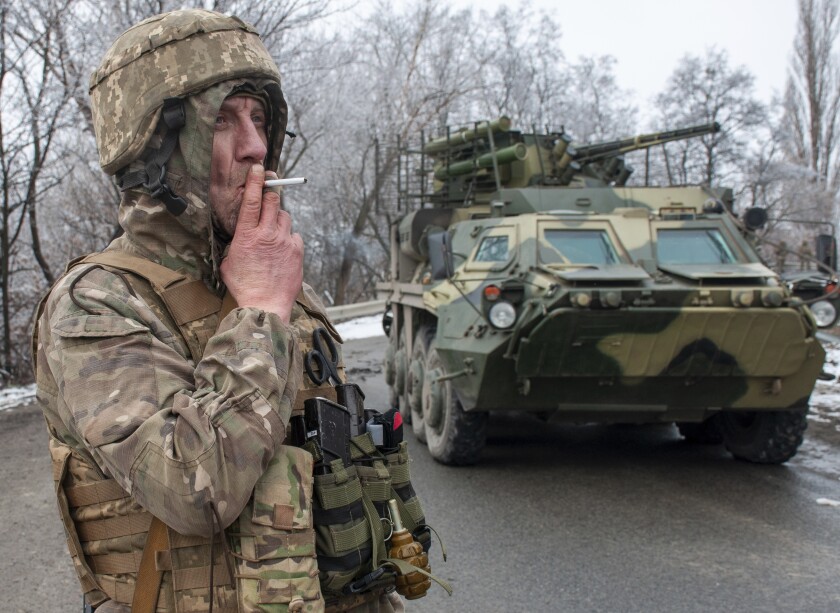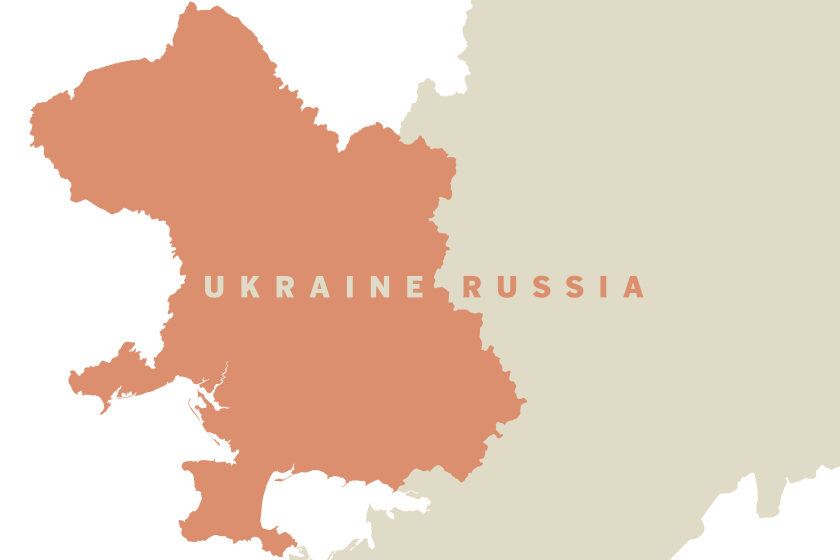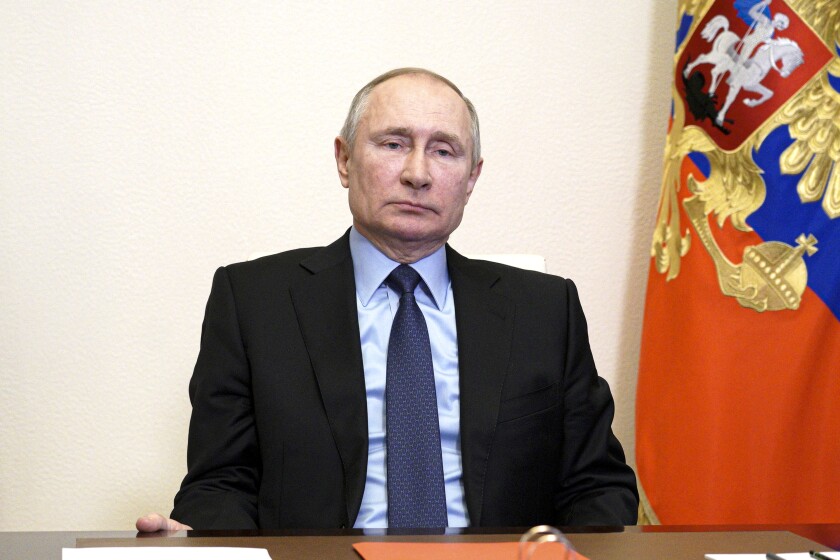Zelensky agrees to negotiate with Russia; Putin puts nuclear forces on alert

Zelensky agrees to negotiate with Russia; Putin puts nuclear forces on alert

A statement issued to Zelensky’s official channel on the Telegram messaging app said the Ukrainian government would dispatch a delegation to meet with its Russian counterparts “without preconditions” on the Ukrainian-Belarusian border, near the Pripyat River.
Earlier in the day, an aide to Russian President Vladimir Putin and the head of the Russian delegation, Vladimir Medinsky, set a deadline at 3 p.m. local time for Ukraine to join negotiations, saying that rejecting the proposal would put “all responsibility for the bloodshed” on the Ukrainian side, according to a report from Russian state news outlet RIA. They received confirmation of the Ukrainians’ participation moments before the deadline ran out, Medinsky later said.
“For our part, we guarantee 100% safety of the route, passage, and we will wait at this place for a delegation of the Ukrainian administration.”
It remains unclear who will head the delegation and where exactly it will meet. Zelensky’s statement said Belarus President Alexander Lukashenko would take responsibility “for ensuring that all planes, helicopters and missiles stationed on Belarusian territory remain on the ground during the Ukrainian delegation’s travel, talks and return.”
Zelensky had rejected an earlier call for negotiations in Belarus, saying that holding talks there — as per Moscow’s instructions — was untenable when Belarusian territory was being used as a staging ground for the Russian invasion. “Of course, we want peace, we want to meet, we want for the war to end,” Zelensky said earlier. “Warsaw, Bratislava, Budapest, Istanbul, Baku — we have suggested all that to Russia.”
Reports later emerged on Sunday that negotiations had yet to begin and may be delayed until Monday.
The news comes even as Putin ordered the Russian army’s nuclear deterrence forces on combat alert. Putin said he was giving the order because “top officials in NATO’s leading countries have been making aggressive statements against our country,” according to a report from Russian state news operator TASS.
“You are what you eat” applies more than just humans.
By feeding cows a diet rooted in agricultural byproducts, California dairy farmers are helping to make the industry more sustainable.
A senior U.S. defense official, responding to those reports on Sunday morning, said, “we have no reason to doubt the validity of this order. But how it manifested itself, I don’t think is completely clear yet.”
“We believe,” the official added, “that this is not only an unnecessary step for him [Putin] to take, but an escalatory one— unnecessary because Russia has never been under threat by the West or by NATO, and certainly wasn’t under any threat by Ukraine, and escalatory because it’s clearly potentially putting at play forces that if there’s a miscalculation could make things much, much more dangerous.”
Still, word of the negotiations gives a glimmer of hope of a cessation of hostilities even as the fighting — now in its fourth day — has brought fierce battles on the streets of Kharkiv, Ukraine’s second-largest city. There were also reports that Russian missiles struck a gas pipeline.
“The Russian enemy’s light vehicles have broken into Kharkiv, including the city centre,” regional governor Oleh Sinegubov said in a Facebook post. “Ukraine’s armed forces are destroying the enemy. We ask civilians not to go out to the streets.”
Kharkiv is about 24 miles from Ukraine’s northern frontier with Russia, making it an essential target for an incursion. But combat in tight urban settings — the city has a population of approximately 1.4 million— is likely to result in a high number of casualties.
On Saturday, an artillery round hit a nine-story residential building in the city. One person was killed and 80 were rescued. As of Saturday afternoon local time, there were 240 civilian casualties, including 64 dead, according to the United Nations Office for the Coordination of Humanitarian Affairs.
The violence has also forced an exodus of some 368,000 people to neighboring European countries, the U.N.’s refugee agency said Sunday, more than double the figure mentioned earlier in the weekend. Governments estimate the war could lead to as many as 5 million refugees.
There was also damage to infrastructure. Outside Kyiv, Russian bombardment hit an oil depot in the town of Vasylkiv, some 20 miles to the southwest. Video posted by Ukraine’s State Service of Special Communications and Information Protection showed a ferocious blaze and a large plume of smoke rising into the night sky above the depot.
“The enemy wants to destroy everything,” Vasylkiv Mayor Natalia Balasinovich said in a Facebook post.
Maj. Gen. Igor Konashenkov, a Russian defense ministry spokesman, said Kherson and Berdyansk in Ukraine “were completely blocked” by Russian forces. The information could not be verified.
Kyiv residents woke up to a quiet, cold but sunny morning, with only a few cars and cyclists breaking a citywide curfew set to expire Monday morning. In the distance, the booms of explosions and the crackle of gunfire pierced the silence.
Beyond Ukraine, international opprobrium against Russia’s campaign — which Moscow insists on calling a “special military operation” but has been condemned as an invasion — is growing.
Belgium said it would deny its airspace to Russian airlines, joining eight other European nations in doing so. Germany reportedly is preparing to take a similar step.
Even the International Judo Federation has taken a stand, suspending Putin’s status as honorary president and ambassador for the group “in light of the ongoing war conflict in Ukraine.”
On Saturday, the Biden administration joined a raft of European allies in agreeing to disconnect a number of Russian banks from SWIFT, the messaging system used by financial institutions for facilitating transactions worldwide. In a statement provided by Russian state news TASS, the Russian central bank said it “has the necessary resources and tools to maintain financial stability and ensure the operational continuity of the financial sector.”
“All customer funds on the accounts are saved and available at any time. Banking services are provided as usual. Bank cards of all banks in Russia also continue to work normally.”
The negotiations may offer an off-ramp for a Russian president facing an increasingly punitive resistance against him, internationally but also in Ukraine. Russian forces, though they have yet to deploy en masse in cities, have faced stiff resistance from Ukrainian troops and from residents armed with rifles and homemade bombs who are furious that a people they once considered brothers are now invaders.
But there’s also evidence that, should negotiations fail, Putin may be prepared to accept a higher death toll. On Sunday, Ramzan Kadyrov, who heads Russia’s Chechnya region and a top Putin ally, said Russian forces had so far been “coddling” their Ukrainian adversaries, who “are armed to the teeth with new weapons, ammunition, heavy equipment of the latest generation.”
“The time has come to make a concrete decision and start a large-scale operation in all directions and on the territory of Ukraine,” he said.
“In my understanding, the chosen tactics in Ukraine are too slow. It takes a long time and, in my opinion, is not effective.”









